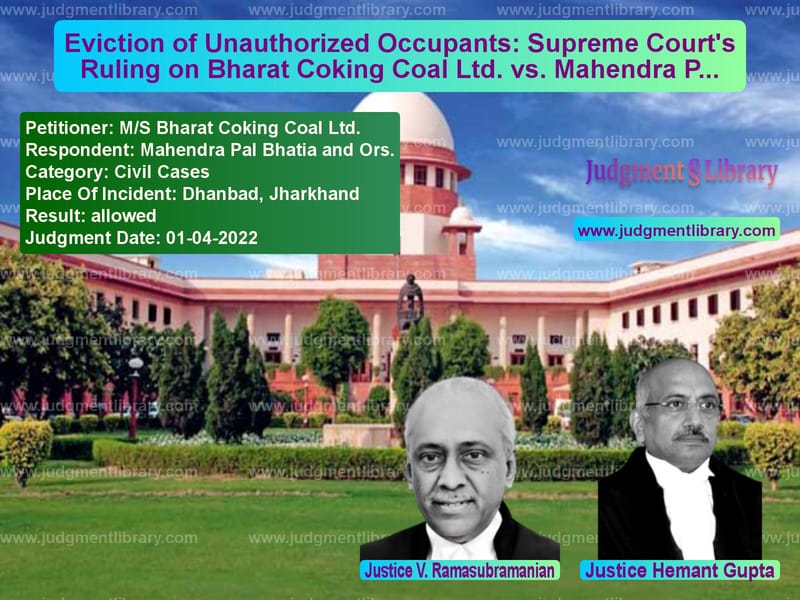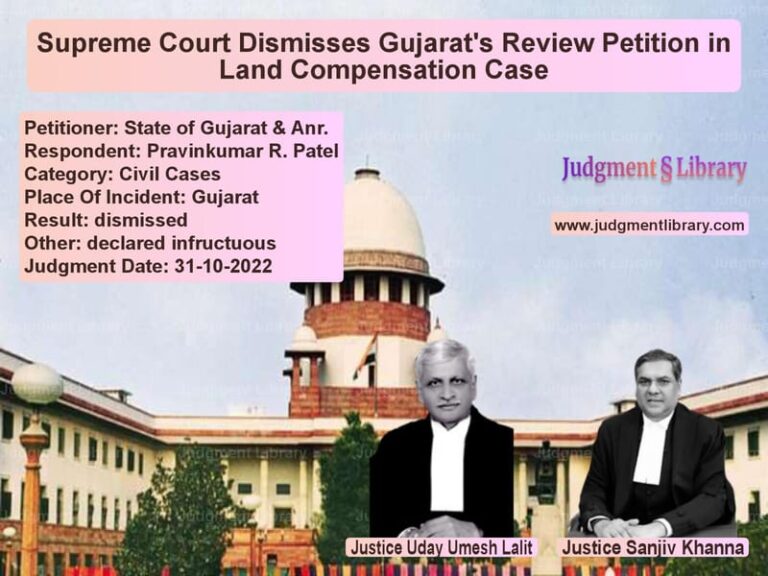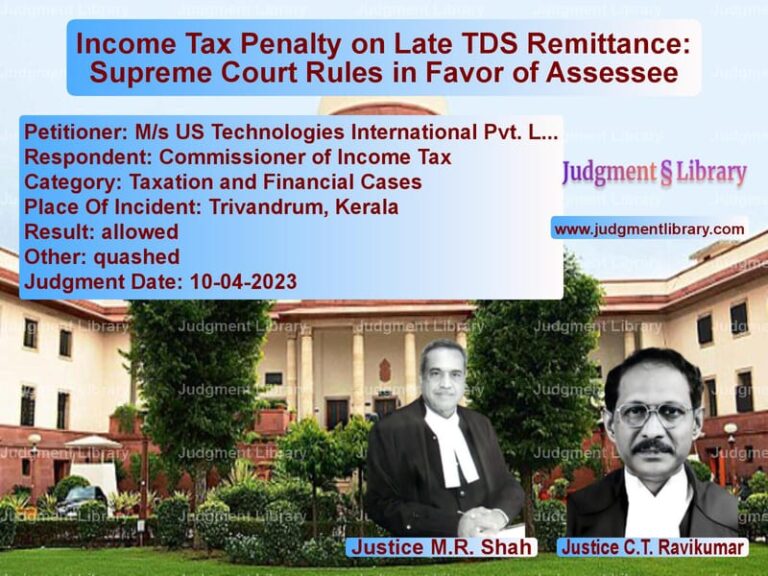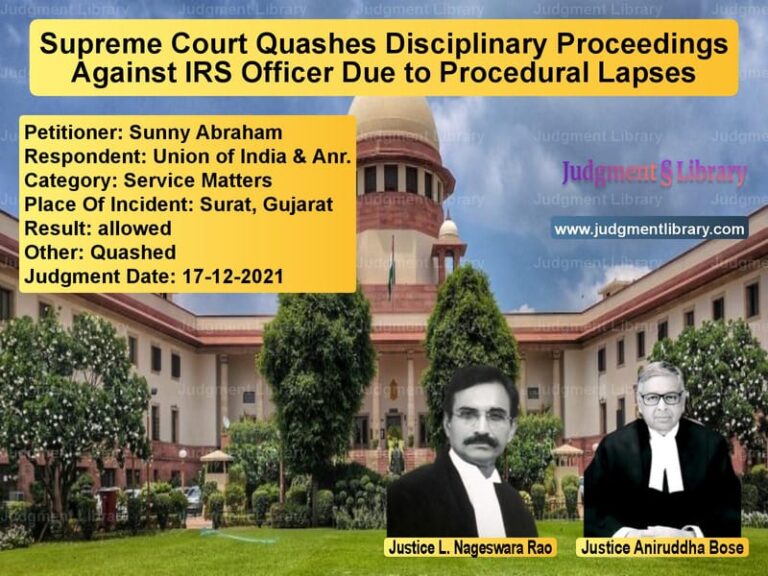Eviction of Unauthorized Occupants: Supreme Court’s Ruling on Bharat Coking Coal Ltd. vs. Mahendra Pal Bhatia
The Supreme Court of India recently ruled on a case that spanned nearly four decades, involving the eviction of unauthorized occupants from public premises under the Public Premises (Eviction of Unauthorised Occupants) Act, 1971. The case, M/S Bharat Coking Coal Ltd. vs. Mahendra Pal Bhatia and Others, revolved around whether a particular property fell under the definition of ‘mine’ as per the Coal Mines (Nationalisation) Act, 1973.
The matter dates back to 1984 when the Estate Officer, Dhanbad, initiated eviction proceedings against the respondents, citing unauthorized occupation of plots in Village Matkuria, District Dhanbad. Over the years, the case saw multiple rounds of litigation in the District Court, High Court, and finally the Supreme Court, which ultimately upheld the eviction order.
Background of the Case
The case traces its origins to the enactment of the Coal Mines (Nationalisation) Act, 1973. The Act transferred ownership of all listed coal mines to the central government, ensuring the nationalization of coal mining in India.
Among the nationalized mines was ‘East Godhur,’ whose owner was listed as East Godhur Colliery Company (Private) Limited, P.O. Dhandad, with a compensation amount of Rs. 4,000. However, the dispute arose over whether certain plots of land, occupied by the respondents, were part of this coal mine and therefore subject to nationalization.
Petitioners’ Arguments
The appellant, Bharat Coking Coal Ltd. (BCCL), argued that:
- The property in question was a part of the nationalized ‘East Godhur’ mine and thus vested in the central government.
- The respondents were unauthorized occupants and had no legal right to continue possession of the land.
- The definition of ‘mine’ under Section 2(h) of the Nationalisation Act was broad enough to cover the disputed land.
- The Estate Officer’s order of eviction was legally justified and needed to be upheld.
Respondents’ Arguments
The respondents, represented by Mahendra Pal Bhatia and others, countered with the following arguments:
- The land in question was private property, acquired through registered sale deeds in 1945 and 1984.
- There was no evidence that the land was ever used for coal mining.
- A Court Commissioner’s report confirmed that the disputed property was located 3 km away from the actual coal mine.
- Since the land was not used for mining, it did not fall under the definition of ‘mine’ under the Nationalisation Act.
Supreme Court’s Judgment
The Supreme Court, comprising Justices V. Ramasubramanian and Hemant Gupta, analyzed the matter in light of the provisions of the Coal Mines (Nationalisation) Act, 1973. The key observations of the Court were:
- Definition of ‘Mine’: The Court examined Section 2(h) of the Act, which defines a ‘mine’ to include lands, buildings, and other assets adjacent to or used for coal mining activities. The Court held that the disputed land fell within this definition.
- Vesting of Property: The Court reiterated that, as per Section 3(1) of the Act, ownership of all listed coal mines automatically transferred to the central government on May 1, 1973, regardless of prior private ownership.
- Commissioner’s Report Irrelevant: The Court dismissed the reliance on the Court Commissioner’s report, stating that it was prepared decades after the nationalization and had no bearing on the legal status of the land.
- Precedents Considered: The Court referred to previous judgments, including Bharat Coking Coal Ltd. vs. Madanlal Agrawal, which clarified that the purpose of nationalization was to ensure uninterrupted coal production.
- Upholding Eviction: The Court ruled that the High Court had wrongly set aside the eviction order. It reinstated the District Court’s decision directing eviction and dismissed the respondents’ claims.
Implications of the Judgment
This ruling has several implications:
- Strengthening Nationalization Laws: The judgment reinforces that properties covered under the Nationalisation Act automatically vest in the government, leaving no room for private claims.
- Clarification of ‘Mine’ Definition: The broad interpretation of ‘mine’ under Section 2(h) ensures that all auxiliary and adjacent lands essential to mining operations are included.
- Precedent for Future Eviction Cases: The ruling provides legal backing for future eviction proceedings against unauthorized occupants of public premises.
- Judicial Review of Government Policies: The Court reaffirmed its stance that policies related to nationalization should be strictly interpreted to preserve government control over natural resources.
Conclusion
The Supreme Court’s ruling in Bharat Coking Coal Ltd. vs. Mahendra Pal Bhatia marks the culmination of a 38-year-long legal battle over the ownership of land associated with nationalized coal mines. The judgment serves as a landmark decision reaffirming the authority of the government in cases of nationalized assets and reinforcing the sanctity of eviction laws. This verdict will likely influence similar cases in the future, ensuring that unauthorized occupants cannot claim rights over land covered by nationalization statutes.
Petitioner Name: M/S Bharat Coking Coal Ltd..Respondent Name: Mahendra Pal Bhatia and Ors..Judgment By: Justice V. Ramasubramanian, Justice Hemant Gupta.Place Of Incident: Dhanbad, Jharkhand.Judgment Date: 01-04-2022.
Don’t miss out on the full details! Download the complete judgment in PDF format below and gain valuable insights instantly!
Download Judgment: ms-bharat-coking-co-vs-mahendra-pal-bhatia-supreme-court-of-india-judgment-dated-01-04-2022.pdf
Directly Download Judgment: Directly download this Judgment
See all petitions in Property Disputes
See all petitions in Damages and Compensation
See all petitions in Contract Disputes
See all petitions in Judgment by V. Ramasubramanian
See all petitions in Judgment by Hemant Gupta
See all petitions in allowed
See all petitions in supreme court of India judgments April 2022
See all petitions in 2022 judgments
See all posts in Civil Cases Category
See all allowed petitions in Civil Cases Category
See all Dismissed petitions in Civil Cases Category
See all partially allowed petitions in Civil Cases Category







